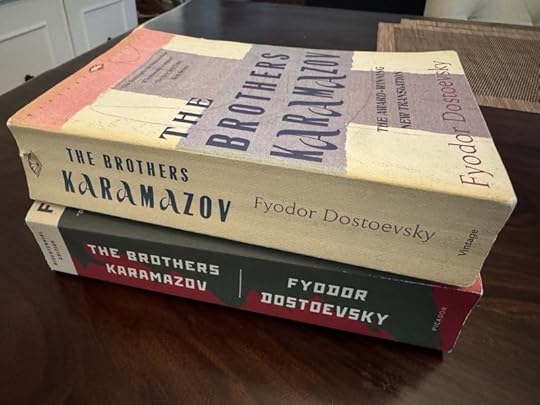back to the brothers
Forty years ago, I attended a conference of literature professors at Christian liberal-arts colleges in which the keynote speaker was an esteemed Christian journalist, tasked with giving us advice, I guess. Whatever his task was, he lectured us about our narrow-mindedness, our parochial attitudes, our failure to introduce our students to the most challenging literary masterpieces. Instead of teaching them … well, whatever we did teach them, we should dare to assign Dostoevsky!
As this harangue went on, the woman sitting next to me — my department chair, as it happened, Beatrice Batson, an impressive Southern lady of the old school who (inexplicably) spoke with the kind of mid-Atlantic accent I associate with Irene Dunne — was steaming. When the lecture finally ended and there was a Q&A session, she stood up and informed the journalist (Sir, pronounced “Suh”) that every student at Wheaton College was required to read The Brothers Karamazov.
“Oh,” he replied.
It was true. In the two-course introduction to literature that all Wheaton students were required to take, a teacher could assign either the Iliad or the Odyssey, and the Greek tragedy of one’s choice; and you needed to do some of the Aeneid and the Divine Comedy but not necessarily all of either. But when the nineteenth-century novel rolled around, one had no options: The Brothers Karamazov ended up being the only work of literature that every Wheaton College student, regardless of major, was required to read from cover to cover.
That edict remained in force for the first twenty years of my Wheaton teaching career, and in those two decades I taught Karamazov at least once each year and sometimes twice. There was a time I knew it better than any book in the world. I began by using this edition:

(Despite the testimony of this cover image, the brothers in the novel are not in their fifties.) But when the Pevear-Volokhonsky translation came out and was clearly the Cool New Thing, I switched to that. And that’s the one I know best. The curriculum had changed and my teaching assignments had changed by the time the great Gary Saul Morson’s fierce critique of their work appeared, so I never taught any alternative to P-V.
When I decided earlier this year that I would teach the book one last time, I thought long and hard about whether to go back to Constance Garnett’s version, which Morson likes, or whether to try a newer translation … but in the end I decided to stick with P-V, in large part because that allowed me to use the greatly-worn, much-annotated copy that I used all those years ago.
However, I did not realize that a revised version of the translation had appeared in 2021 — and that’s the one the bookstore ordered for my students. If the text had remained the same, I probably would’ve used my old version and identified the page numbers of the key passages for the new edition. But sometimes the actual words are different, dadgummit. (For example, where in the previous version old Karamazov claimed to love his own “wickedness,” in this one he claims to love his own “filth.” I do wonder how many of the changes are responses to Morson’s critique.) So now I’m having to transfer all my annotations and highlights from the old copy to the new, which is tiresome but probably good for me.
The book is as electrifying as ever, and I am delighted to be immersed in its strange world again. Reports from my journey will be forthcoming over the next few weeks.

Alan Jacobs's Blog
- Alan Jacobs's profile
- 533 followers



